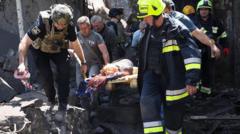Chancellor Friedrich Merz emphasizes the need for Europe to unite against potential threats, particularly from Russia, as NATO partners prepare for historic defence spending commitments.
Germany Promises Strong Defence Commitment at NATO Summit in The Hague

Germany Promises Strong Defence Commitment at NATO Summit in The Hague
As NATO leaders arrive for the critical summit, Germany reinforces its dedication to European security amidst rising tensions.
In a pivotal move reflecting the current global landscape, German Chancellor Friedrich Merz asserted that Germany would uphold its fair share of Europe's defence during the NATO summit taking place in The Hague. Merz warned of the ongoing aggressive ambitions of Russian President Vladimir Putin, who aims to reclaim Ukraine, and highlighted the necessity for collective strength to maintain peace in Europe for future generations.
US President Donald Trump is also attending the summit, marking his first since 2019, where leaders from 32 nations are expected to agree on a target defence spending of 3.5% of their national GDP, alongside a commitment of an additional 1.5% for related infrastructure. This financial shift is particularly crucial given recent escalations in the Israel-Iran conflict, adding urgency to the discussions.
NATO Secretary General Mark Rutte urged European allies to prioritize defence investments over concerns regarding US support. He underscored a commitment from US leadership to NATO, anticipating that European nations and Canada would collectively contribute more than $35 billion (£26 billion) toward military assistance for Ukraine in 2023 alone. The conflict continues to escalate, with missile attacks on Ukrainian cities resulting in civilian casualties and extensive damage, reinforcing the importance of this summit.
Furthermore, NATO leaders are expected to activate a substantial new investment plan which would elevate the defence spending benchmark to 5% of GDP, a stark increase from the current recommendation of 2%. Most NATO members currently fall below this target; therefore, Germany has introduced a budget plan aimed at achieving the 3.5% spending goal by 2029, with allocations rising from €62.4 billion (£53bn) in 2025 to €152.8 billion in 2029.
Merz clarified that Germany's departure from low defence spending is not a concession to the United States but a proactive measure to secure Euro-Atlantic safety against Russian aggression. Throughout the summit, Merz is expected to engage in discussions with notable leaders, including UK Prime Minister Sir Keir Starmer and French President Emmanuel Macron.
The summit's proceedings have been paced to accommodate President Trump, featuring a dinner hosted by the Dutch king followed by strategic sessions. An anticipated five-paragraph agreement will articulate the leaders' commitments to bolster defence infrastructures and military readiness. Nevertheless, NATO’s ambitious objectives face challenges as some nations, like Spain, seek exemptions from the proposed spending targets, casting uncertainty on a unified response to shared threats.
As leaders from around the globe converge in The Hague, logistical issues arise, including disruptions in train travel linked to potential sabotage. The outcome of this summit could significantly shape NATO's strategic posture in a world rife with geopolitical strife and uncertainty.
US President Donald Trump is also attending the summit, marking his first since 2019, where leaders from 32 nations are expected to agree on a target defence spending of 3.5% of their national GDP, alongside a commitment of an additional 1.5% for related infrastructure. This financial shift is particularly crucial given recent escalations in the Israel-Iran conflict, adding urgency to the discussions.
NATO Secretary General Mark Rutte urged European allies to prioritize defence investments over concerns regarding US support. He underscored a commitment from US leadership to NATO, anticipating that European nations and Canada would collectively contribute more than $35 billion (£26 billion) toward military assistance for Ukraine in 2023 alone. The conflict continues to escalate, with missile attacks on Ukrainian cities resulting in civilian casualties and extensive damage, reinforcing the importance of this summit.
Furthermore, NATO leaders are expected to activate a substantial new investment plan which would elevate the defence spending benchmark to 5% of GDP, a stark increase from the current recommendation of 2%. Most NATO members currently fall below this target; therefore, Germany has introduced a budget plan aimed at achieving the 3.5% spending goal by 2029, with allocations rising from €62.4 billion (£53bn) in 2025 to €152.8 billion in 2029.
Merz clarified that Germany's departure from low defence spending is not a concession to the United States but a proactive measure to secure Euro-Atlantic safety against Russian aggression. Throughout the summit, Merz is expected to engage in discussions with notable leaders, including UK Prime Minister Sir Keir Starmer and French President Emmanuel Macron.
The summit's proceedings have been paced to accommodate President Trump, featuring a dinner hosted by the Dutch king followed by strategic sessions. An anticipated five-paragraph agreement will articulate the leaders' commitments to bolster defence infrastructures and military readiness. Nevertheless, NATO’s ambitious objectives face challenges as some nations, like Spain, seek exemptions from the proposed spending targets, casting uncertainty on a unified response to shared threats.
As leaders from around the globe converge in The Hague, logistical issues arise, including disruptions in train travel linked to potential sabotage. The outcome of this summit could significantly shape NATO's strategic posture in a world rife with geopolitical strife and uncertainty.





















